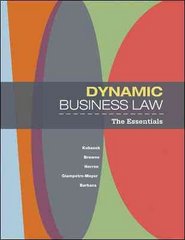Question
Efficient Taxation of 'Diamond' Goods (Ng, AER, 1987) Consider a consumer who derives utility from three consumption goods: x and y and z, which prices
Efficient Taxation of 'Diamond' Goods
(Ng, AER, 1987)
Consider a consumer who derives utility from three consumption goods:
x and y and z, which prices are given, respectively, by x y z p , p and p . We
let z denote the numeraire good and normalize its prices to unity. The
consumer possesses an initial endowment of Z>0 units of z.
The utility function of the consumer is given by:
(1) U (x, y, z)= v(x) + u( y . py) + z
Thus, the consumer is deriving utility from the amount she spends on y
and not from the number of units consumed.
The government is seeking to raise funds in the total amount of R>0
(units of z). For this purpose it considers the following two alternative
options: (i) levying a lump-sum tax; (ii) imposing an ad-valorem tax on
consumption good y.
(1) Provide a theoretical explanation for the special form of the
utility function we employ.
(2) What would be the optimal choice of the government?
Step by Step Solution
There are 3 Steps involved in it
Step: 1

Get Instant Access to Expert-Tailored Solutions
See step-by-step solutions with expert insights and AI powered tools for academic success
Step: 2

Step: 3

Ace Your Homework with AI
Get the answers you need in no time with our AI-driven, step-by-step assistance
Get Started


